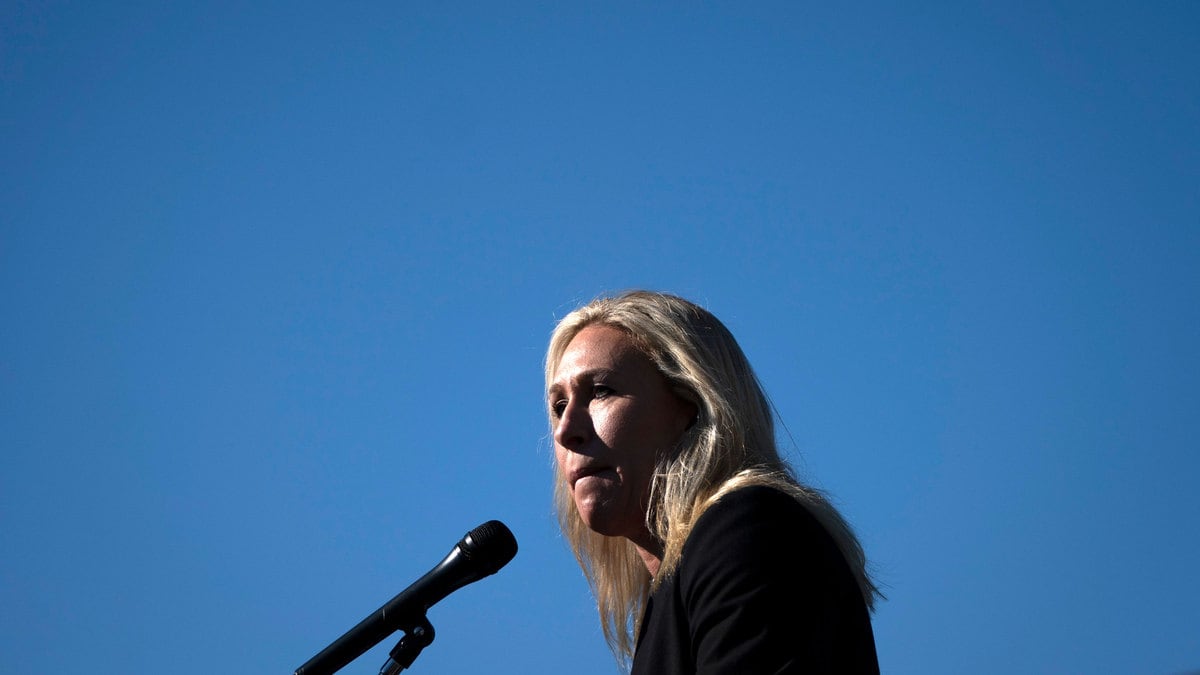Last September, Rep. Marjorie Taylor Greene (R-GA) called for a shutdown to stop government spending. Four days later, she lent the government money.
Financial disclosures show that on Sept. 21, the anti-government conspiracy theorist bought between $250,000 and $500,000 in U.S. Treasury bills—low-yield financial instruments that help the government fund the debt and pay expenses such as salaries.
Greene, of course, has styled herself as a fierce fiscal hawk, going so far as to co-sponsor a bill earlier this year titled “Recognizing the national debt as a threat to national security.”
ADVERTISEMENT
But Greene must not think it’s much of a threat: The T-bill purchase was her largest transaction of the year—and it’s not even close.
Greene, who is a multimillionaire, has traded heavily in securities since she joined Congress a year ago, executing 76 purchases and 14 sales. Of those 90 transactions, the second-largest purchase range behind the T-bill buy was between $15,001 and $50,000—a difference of hundreds of thousands of dollars. (Congressional disclosures only give dollar amounts in ranges.)

Rep. Marjorie Taylor Greene (R-GA) speaks at a news conference on Republican lawmakers’ response to the Jan. 6 attack.
Anna Moneymaker/GettyAt most, the T-bill investment—a joint purchase between Greene and her husband, Perry—would have nearly quintupled the total amount of securities they bought last year. Greene’s 2019 candidate disclosure showed Treasury holdings between $50,000 and $100,000, but that item does not appear on her 2020 filing, indicating the notes had matured.
It also appears that Greene’s threats to the debt ceiling may have juiced the return on her own investment—although generally speaking, there isn’t much juice to squeeze out of the safe, low-yield T-bills.
Still, the possibility of a government default last fall made investors skittish, and the rhetoric from Greene and fellow Republicans injected further risk into the markets. As a result, yields were on the rise right around the time Greene made her purchase, then fell after the crisis passed, according to Treasury Department data.
Asked about the investment, a spokesperson for Greene’s office provided a statement which said, in full, that “Congresswoman Greene has an investment advisor that has full discretionary authority over her account.”
The statement did not say who had executed the purchase or made the decision to do so, and the spokesperson did not reply when asked in a follow-up email. The spokesperson also did not respond to follow-ups about whether the adviser was aware of Greene’s ideology and routine fiscal bombast, or if the agent still retained her confidence.
Still, adviser or not, it’s tough to ignore the context.
Last March, Greene said in a House floor speech that the debt threatened to “enslave the American people, our children, our grandchildren, our great-grandchildren, and generations going forward.” She then moved to adjourn Congress, stalling a vote on a $1.9 trillion COVID relief package.
In her short time in Congress, Greene has endorsed multiple government shutdowns over Democratic spending packages. She did just that in an interview with rehabilitated MAGA influencer Steve Bannon just a few days before her T-bill purchase.
“You can’t trust these people with your money,” she told Bannon.
Greene—who co-owns a sizable construction business with her husband—then argued that the private sector would do a better job with the nation’s infrastructure.
“Guess what? The American people can get it done at home without the government! I say, put up a fight, shut it down!” she said. “We shouldn’t be spending this!”
Then, a week to the day after injecting as much as half a million dollars into the government, Greene spewed a series of tweets from her now-suspended account criticizing an array of arcane government-funded projects.
“Just pass the bill and then we will all find out what’s in it. Right? I mean why read 3,000 plus pages of trillions in spending?” she posted, alongside a photo of what appeared to be the bill on her desk.
“Silly Marjorie,” she added. “Professional politicians don’t read the most expensive spending bills in history. That’s not how things are done in the swamp.”
Two weeks later, Greene once again took to the House floor to argue that Congress should not raise the debt ceiling, and, once again, she moved to “shut it down,” tweeting “#peopleoverpoliticians.”
Last month Greene was back at it, calling to “shut it down” over the $29 trillion national debt she had just supported with her own money. But when Senate Minority Leader Mitch McConnell cut a debt ceiling deal with Democrats, Greene blasted him as “Biden’s [bitch].” Ex-President Trump posted that burn himself.
And in a floor speech last February, Greene invoked her supposedly hawkish fiscal ideology as among the key reasons she was attracted to Trump’s politics in the first place.
“I thought, ‘Finally, maybe this is someone that will do something about the things that deeply bother me.’ Like the fact that we’re so deeply in debt,” she said. (Trump, however, had just weeks before that speech proved Greene’s hunch very wrong, ending his presidency with a $7.8 trillion debt increase; the 36 percent hike was the third-largest in U.S. history, behind wartime presidents George W. Bush and Abraham Lincoln.)
But the purchase is all the more curious given that this kind of rhetoric from Greene was injecting markets with further risk.
Generally, financial advisers consider T-bills one of the safest possible places to park money, because the government guarantees payment in full. The short-term financial instruments offer a range of maturity options, as short as a month and as long as a year. But because they’re short-term, political games of chicken around the debt ceiling—risking a government default—can, sometimes, turn investors off.
Signs of that aversion were apparent when Greene made her purchase. The day after her investment, the Federal Reserve announced that T-bills set to mature over the next two months had become “modestly elevated as investors reduced exposures to securities that could be at risk for delayed payments”—meaning the market’s appetite for Treasuries had soured at the possibility of default.
Treasury data also shows that Greene made her investment when T-bill yields were increasing—that is, as investors shied away amid threats that Greene herself was making. Increased yields mean a higher return on the investment. (Greene’s spokesperson would not disclose the maturity date on her T-bills.)
Jim Vogel, executive vice president at FHN Financial, told The Daily Beast that because investors had been burned in prior debt-ceiling cage matches, they began to look elsewhere in the fall when the clock began running out, leading to the bounce in yields. However, Vogel said, that didn’t necessarily mean that GOP hostage-taking had prompted genuine fears of default.
“Most of the reaction this time was less about fear of getting repaid, and more about fear of explaining why you took the risk,” Vogel explained. He observed that this was a “milder episode” of uncertainty, because investors understood that full Democratic control of Congress and the White House “could allow Democrats to act unilaterally if it came down to a default scenario.”
Guy Lebas, chief fixed-income strategist at Janney, explained that, while the T-bill market did see a bump, the government instruments are stable and don’t experience the same swings as short-term private investments, such as stocks. “If you’re not buying in the billions, vacillations in yields have a very small impact on returns,” Lebas said.
But Ben Edwards, a securities expert at the University of Nevada Las Vegas William S. Boyd School of Law, pointed out that the debt-ceiling showdown still created a great deal of uncertainty, and any uncertainty puts capital at risk generally.
“Ironically, Marjorie Taylor Greene and friends are the risk,” Edwards said. “But at the same time, Treasuries are always a safe bet. The U.S. government is more likely to pay debt than Apple.”
Disclosures also show the Greenes bought between $15-001 and $50,000 in Apple stock last year.







